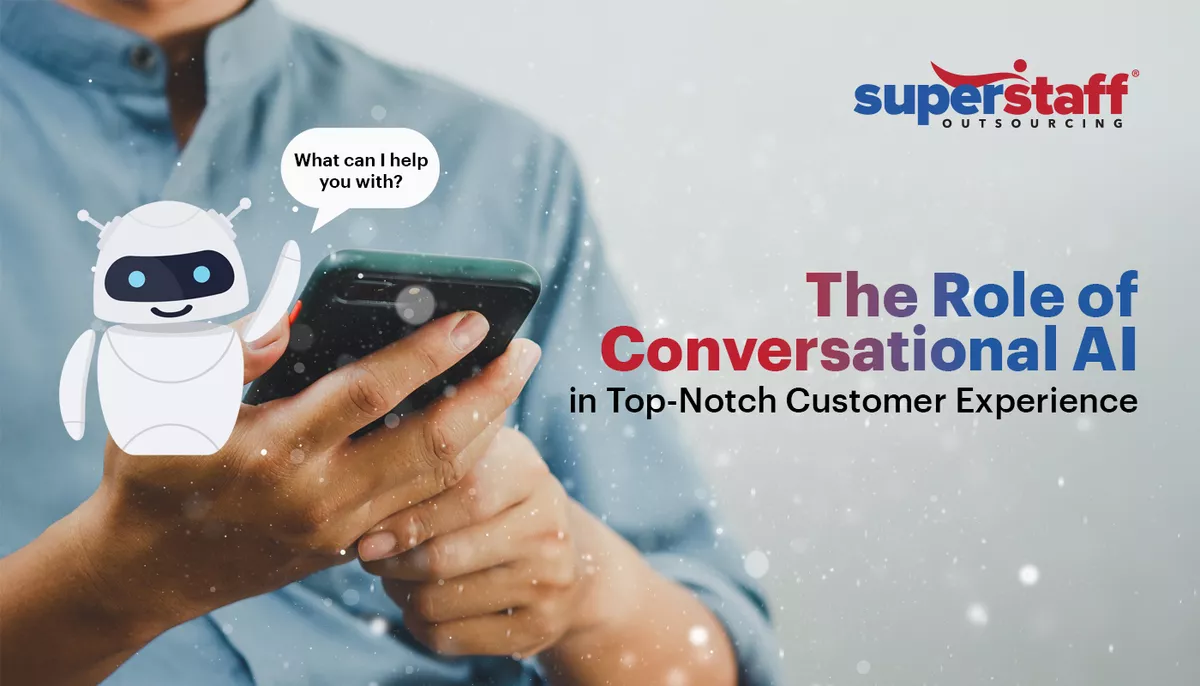
The pandemic revolutionized the way businesses operate and interact with their customers. As it accelerated the digital transformation across industries, one thing became abundantly clear: the customer experience is now more critical than ever before. By providing seamless touch points, personalizing experiences, and embracing innovation, you can create a buying journey that sets your business apart from the competition.
One of the most exciting advancements in this endeavor is Conversational AI — a cutting-edge technology transforming the way businesses interact with their customers.
Understanding Conversational AI
Consumer touch points can overwhelm any business — no matter the size or nature of your industry. With customers reaching out at all hours of the day across all platforms, it can be challenging to keep pace with the sheer volume of contacts, even with 24/7 support and all hands on deck.
The good news is AI can help. Tech is a tremendous asset you can leverage to streamline your customer service. But it comes with one slight caveat. If you don’t know how to properly implement conversational AI, crude computer language can alienate your customers.
When faced with issues, your customers expect something AI cannot provide: Empathy.
Fortunately, conversational AI technology can help them feel valued even if they’re just conversing with robots. It’s the practical middle ground between improved efficiency and an elevated customer experience.
Unlike conversational AI, computer language is often characterized by limited syntax and low-level operations. Lacking natural language processing (NLP) capabilities, it relies on predefined commands and static, rule-based programming.
Meanwhile, conversational AI excels at understanding and processing human language. It engages in natural, adaptive interactions, making it user-friendly and suitable for a wide range of applications, from customer service chatbots to virtual assistants.

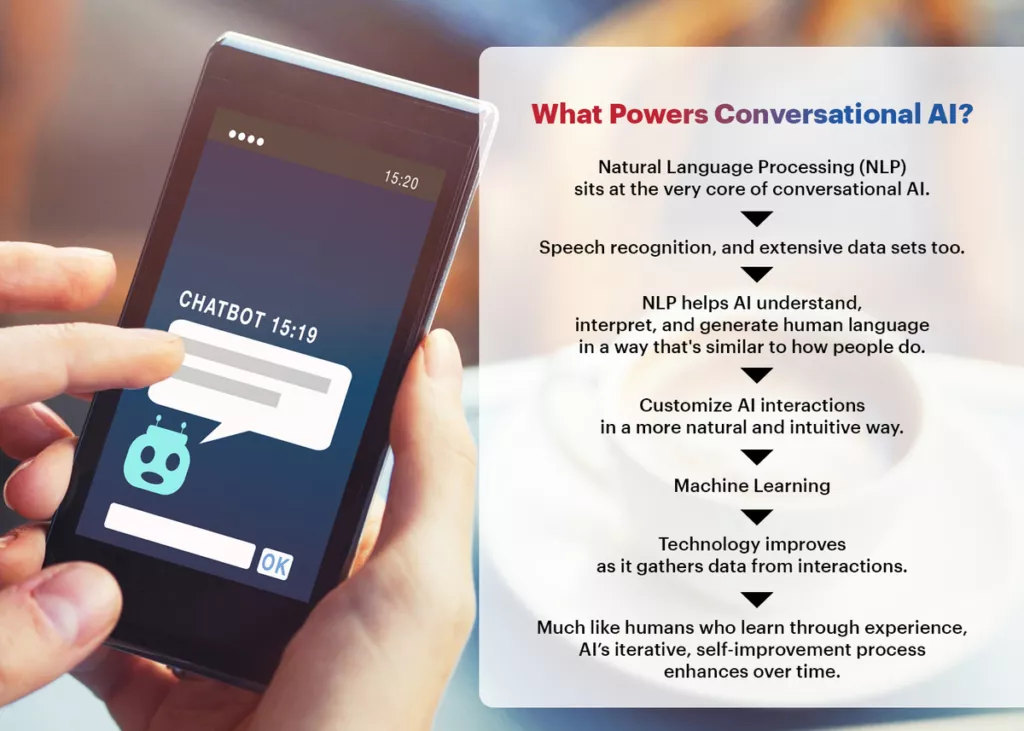
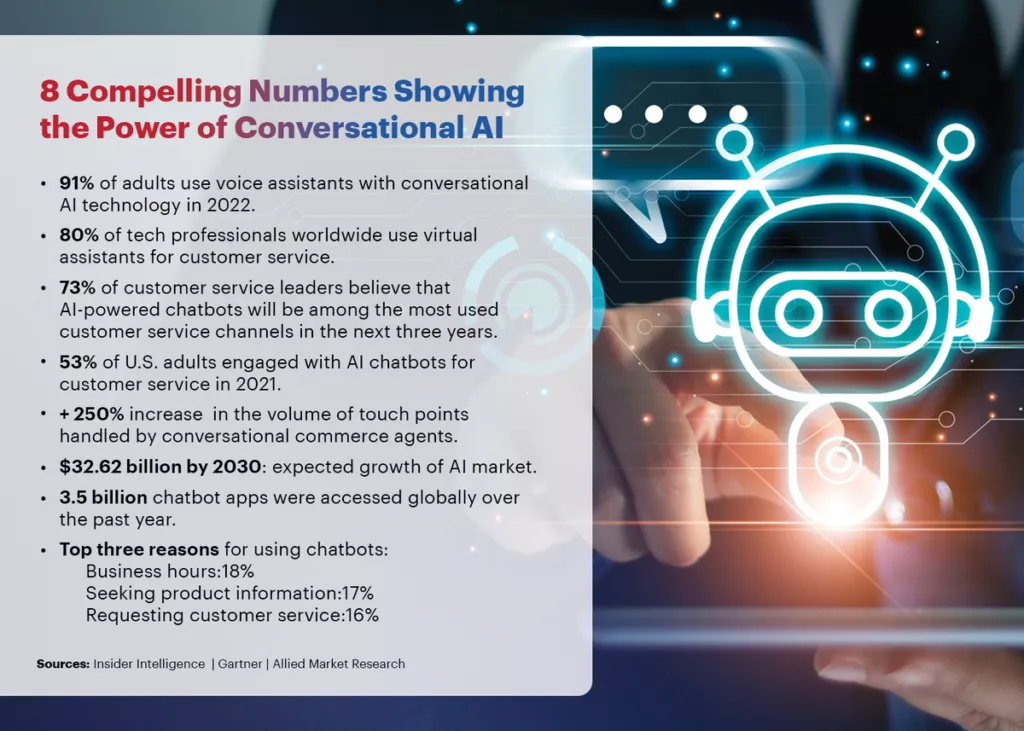
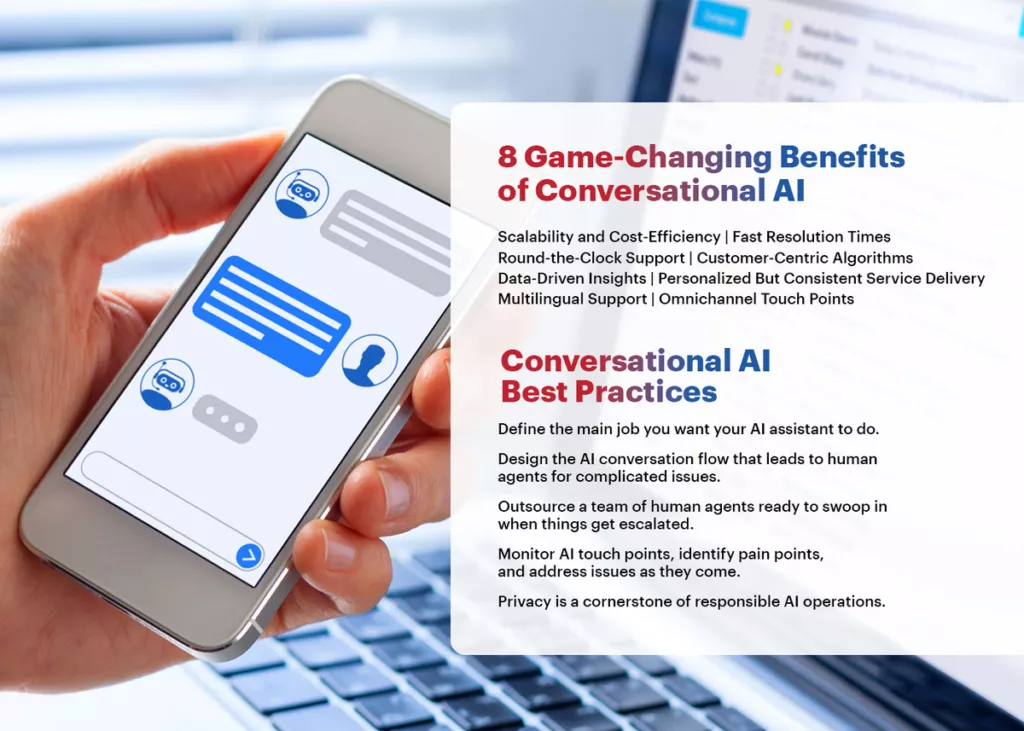
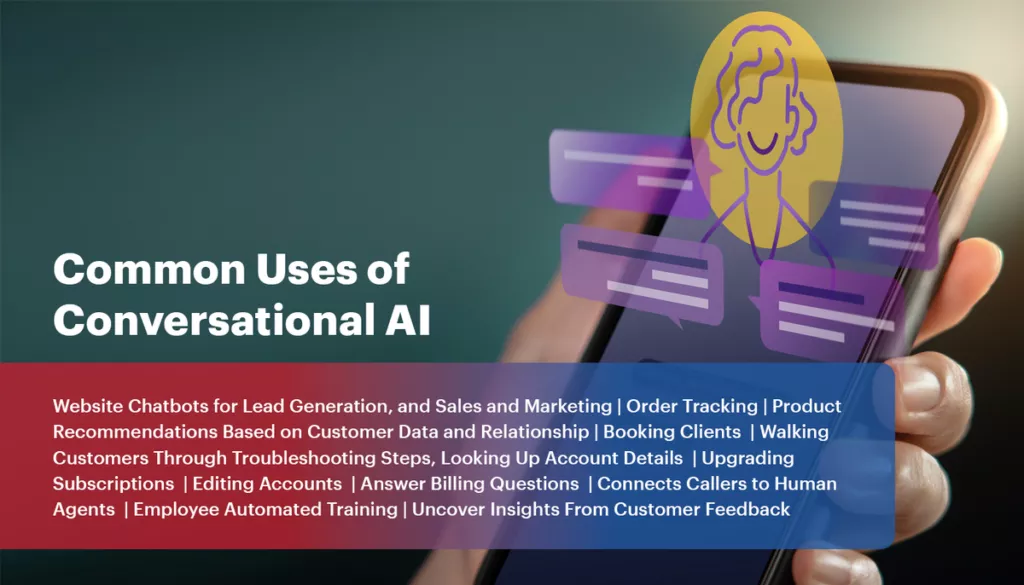
Benefits of Conversational AI
The numbers don’t lie.
With its ability to boost accessibility and personalize touch points, conversational AI is reshaping the customer service landscape. It’s no longer just a technological advancement; it’s an imperative strategy for businesses aiming to drive revenue with exceptional CX. Let’s take a closer look at the top advantages this cutting-edge technology brings.
- Scalability and Cost-Efficiency
Conversational AI-powered chatbots are like hyper-efficient multitaskers. They can handle a huge volume of touch points all at once without dropping the ball on quality.
It’s like having a team that grows effortlessly with demand, for a fraction of the cost. This means you can cater to a much larger customer base without having to exponentially increase your expenses.
- Fast Resolution Times
Resolution time is critical. Getting a reply within 10 minutes of reaching out can make or break your customer experience. Sadly, while every customer interaction warrants the same level of urgency, the reality is that some inquiries are more complex than others — hence they require more time.
The answer is AI. Leveraging a chatbot ensures that all customers’ needs are addressed promptly.
When it comes to speed, the human brain is no match for artificial intelligence. For instance, it may take us a couple of minutes to solve a single mathematical problem, but AI can tackle ten of them in the span of a minute. This translates to shorter wait times, leading to improved operational efficiency and customer satisfaction.
- Round-the-Clock Support
Not all your customers operate in your time zone, and sometimes, even those who do prefer to reach out beyond business hours because it’s more convenient for them. How can you ensure you’ll be there when they need you? Through AI-powered chatbots, your ever-reliable 24/7 operator.
Leveraging AI shows a deep commitment to the customer experience. This means that your dedication to your customers extends beyond business hours. By providing ongoing support, you’re sending a powerful message to your customers. “We’re here for you, no matter what, and we’re ready to help.” With this, customers feel more valued and cared for.
But here’s the kicker: 24/7 availability isn’t just about customer satisfaction. It’s also a game-changer when it comes to extending the reach of your sales team.
One of the best things about doing business online is that sales can happen whenever. By being available at all hours of the day, you keep the momentum going. This gives you a great opportunity to upsell and cross-sell more of your offerings, fueling your revenues.
- Customer-Centric Algorithms
More than just a customer support tool, conversational AI is also a savvy sales assistant.
Thanks to machine learning, AI can dish out personalized experiences uniquely tailored for your customers. It’s like having their own personal shopper that suggests products and add-ons based on their shopping algorithms.
With 49% of shoppers having made impulse buys thanks to personal recommendations, this can significantly drum up your revenues. It’s ultimately a win-win. Delivering more than just top-notch customer service, AI also boosts your bottom line by making sure your customers get the products that are just right for them.
- Data-Driven Insights
As early as 2013, a McKinsey study already highlighted the importance of consumer analytics, pointing out that data can drive up customer acquisition by 23x, profitability by 19x, and loyalty by nine times. But with exponentially more consumer data available to businesses today, the numbers are bound to go up.
One way to take advantage of this is through AI platforms. AI-driven analytics offers a backstage pass to consumer needs and spending behavior. Leveraging these insights, you can shape your offerings, fine-tune your marketing strategies, and tailor them to what your customers truly care about.
What’s more, AI-driven systems are extremely precise and rarely miss a beat when it comes to processing and delivering information. This means there’s a lot less room for errors that could potentially harm your customer experience.
- Personalized But Consistent Service Delivery
In a more recent study, McKinsey also revealed that most (71%) of consumers expect personalized interactions and a staggering 76% get frustrated when brands can’t deliver.
Personalization simply pertains to giving each customer the VIP treatment. Imagine walking into your favorite local cafe, and the barista already knows your usual order. That’s personalized CX — and AI is a massive help in this process.
By leveraging data insights, ML, and NLP, chatbots can instinctively deliver a response that’s always spot-on and uniquely tailored to each customer, making every touch point more than just a one-time transaction but a solid foundation for genuine connections.
However, this doesn’t mean that your standard of quality service has to suffer. On the contrary, AI streamlines your entire CS system to ensure that every customer gets the same top-notch service, no matter when they reach out — whether it’s morning or midnight, they’re guaranteed the gold standard of customer care.
- Multilingual Support
To truly connect with your customer base and expand your reach, you must cater to the diverse linguistic needs of your target market. With over 7,100 languages spoken globally, sticking to just one will hold you back from reaching a wider audience. In addition to this, implementing multilingual solutions has also been proven to boost client satisfaction, with nearly three-fourths (71.5%) of customer service leaders recognizing its impact.
One of the most strategic and cost-efficient ways to deliver this kind of support is with AI. Multilingual capacity is an extremely valuable but often overlooked feature of conversational AI. Chatbots and virtual assistants typically come equipped with language translation capabilities, enabling them to effectively detect, interpret, and generate content in nearly all languages.
This means your touch points won’t hit unnecessary roadblocks caused by language barriers. Ultimately, multilingual chatbots enhance the inclusivity and accessibility of your business to welcome a broader spectrum of customers and significantly increase customer loyalty.
- Omnichannel Services
One recent study revealed that companies that leverage omnichannel strategies get a much higher customer retention rate (89%) compared to those that don’t (33%).
This is because in today’s fast-paced digital age, customers are ubiquitous. They might start their journey on your website, switch to a messaging app, shoot over an email, and even pop up on social media, all in one go. So, it’s not just about being present on all these platforms, it’s about being present and coherent.
That’s where omnichannel customer service comes in. Creating a seamlessly connected experience, it collects data from all these interactions and uses it to tailor a harmonious experience across channels. More than just having a chatbot on your website and a customer service agent on the phone, it’s about integrating these channels, sharing information, and providing a consistent experience for your customer’s utmost convenience.
Elevate Your CX With These Conversational AI Best Practices
Conversational AI has emerged as a powerful tool to enhance customer interactions and streamline operations. To make the most of this technology, it’s important to follow best practices that ensure a seamless and effective implementation.
We’ve outlined key strategies to help you maximize the potential of Conversational AI and deliver an outstanding customer experience.
- Clear Purpose and Defined Goals
When you’re diving into the world of conversational AI, you’ve got to know what you’re after. What’s the main job you want your chatbot or virtual assistant to do? Is it helping customers with their questions? Guiding them through a booking process? Or maybe suggesting products they’ll love? Once you’ve got that figured out, you’re basically setting the stage for success.
Defined goals give you something to measure. You can track how well your AI is doing its job, whether it’s increasing customer satisfaction or boosting sales.
- Seamless Escalation to Human Agents
While AI is an exceptional tool, it’s not the be-all, end-all of customer service. There are times when a customer’s issue might be a bit too complex for AI bots to tackle alone — that’s where human agents step in.
Think of it this way: chatbots are a strategic ally to your customer service team. They’re there to assist, not take over. It’s absolutely critical to have your real-life agents ready to swoop in when things get a bit more involved.
The great thing is you can actually design the conversation flow to make this transition smooth. Chatbots can seamlessly hand off the conversation to a human agent, without your customers even knowing it.
This handover is a safety net for your customer service operation, ensuring that every customer, no matter how complex their question, gets the attention and expertise they need.
- Operations Maintenance
Much like any tech, your customer service operations need constant tune-ups to stay in tip-top shape.
You can start by keeping your ears on the ground. Through feedback loops, you can monitor the quality of your touch points, identify pain points, and address issues as they come. Staying current is just as crucial. Just to name a few, market behavior, industry trends, and cutting-edge technology are all aspects you need to track and keep pace with.
- Data Privacy
Privacy is a cornerstone of responsible AI operations. It creates a safe environment for your customers, ensuring that their information is handled with the utmost care.
Since there are laws and regulations in place to safeguard data, your AI system needs to comply. More than just a checkbox on a compliance list, cybersecurity is about doing right by your customers, respecting their boundaries, and fostering a relationship built on trust.
- Partnering With Outsourced CX Experts
Outsourcing is like bringing in a dream team to elevate your customer support game.
With their vast industry experience and resources, these experts are like seasoned pros in the field of customer experience. Service providers are also a fully scalable extension of your team that you can ramp up or down based on demand.
Cost-effectiveness is another competitive advantage outsourcing brings. Instead of hiring and training an entire in-house team, you’re tapping into a ready-made pool of skilled professionals. This means you’re saving on recruitment, training, and infrastructure costs, but still delivering top-tier service.
Ultimately, outsourcing is a strategic move that can truly take your customer support to the next level!
Common Examples of Conversational AI Uses
From being your 24/7 customer support buddy to your personal shopping assistant and even your trusted medical advisor, conversational AI is changing the way we interact with technology.
Let’s take a closer look at everyday examples that showcase just how versatile it is.
Customer Support Chatbots
Those little chat windows that pop up when you’re browsing a website are called chatbots. They’re like helpful digital assistants that businesses leverage to help customers sort out common issues, such as order tracking and tech support.
Virtual Assistants
Siri, Google Assistant, or Alexa are examples of voice-activated virtual assistants. Powered by conversational AI, they are able to do all sorts of things, from setting reminders to telling you the weather forecast.
E-commerce Recommendations
E-commerce platforms also use AI-powered chatbots to suggest products to consumers. Leveraging customers’ preferences and browsing history, they can elevate your customers’ buying experience, while increasing your revenues.
Healthcare Chatbots
Chatbots are also lending a hand in the healthcare sector. They help book appointments, answer health questions, and share general info — ensuring real-time responses for patients in need of urgent medical care.
Marketing and Sales
You can also leverage AI chatbots for marketing. They talk to potential customers, figure out if they’re a good fit, and guide them through their buying journey.
These are just a few examples of how AI is making an impact across industries, enhancing customer experiences, improving efficiency, and streamlining processes. With its versatility and adaptability, conversational AI continues to drive innovation and transformation in the business landscape.
Leveraging Conversational AI for Top-Notch Customer Service
Outsourcing your customer service to leverage Conversational AI is not just a forward-thinking move, it’s a strategic investment in the future of your business. With expertise, scalability, cost efficiency, 24/7 availability, and seamless technology integration, SuperStaff delivers a level of customer support that sets you apart in today’s competitive landscape.
Reach out to us today to elevate your customer support game and stay ahead in today’s competitive landscape!





